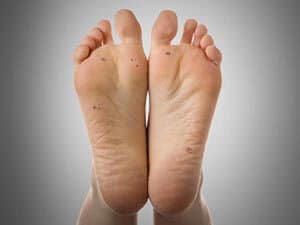Treatment for Plantar Warts in Delhi
Plantar Warts

Plantar warts are noncancerous skin growths, usually occurring on the bottom of the foot; around the base of the toes and forefoot or the heel. It is caused by a viral infection in the top layer of the skin. The cause of infection is a strain of virus called Human Papilloma Virus or HPV.
Here are a few symptoms to identify Plantar Warts:
- A small, fleshy, rough, grainy type of lesion on the bottom of your foot. The growth will be seen usually at base of the toes, at your forefoot or the heel.
- You may also see a hard thickened blot of skin which is called callus, present at a particular point, which is a wart grown inwards.
- If black pinpoint, commonly called wart seeds, are seen, then they are clotted blood vessels.
- A wart is also in form of a lesion that interrupts the normal lines and ridges in the skin of your foot.
- You would feel pain or tenderness while walking and standing.
What are the major causes of Plantar Warts?
Usually caused by an infection with HPV (Human Papilloma Virus) in the outer layer of the skin, Plantar Warts affect the soles of the feet. This virus can enter the body through tiny cuts, breaks or weak spots on the bottom of the feet.
Here is how HPV enters and affects the people of various age groups:
- Each person’s immune system responds differently to HPV.
- Not everyone who comes in contact with it develops warts. Even people in the same family react to the virus differently.
- The HPV strains that cause plantar warts aren’t highly contagious. So the virus isn’t easily transmitted by direct contact from one person to another.
- HPV thrives in warm, moist environments.
- One may come in contact of the virus by walking barefoot around swimming pools or locker rooms.
- If the virus spreads from the first site of infection, more warts may appear.
- Anyone can develop plantar warts, but this type of wart is more likely to affect:
- Children and teenagers
- People with weakened immune systems
- People who have had plantar warts before
- People who walk barefoot where exposure to a wart-causing virus is common, such as locker rooms
Various treatments for Plantar Warts:
- For temporary relief, a piece of moleskin can be placed around the wart.
- In early stages, wart can be removed using a pumice stone or some other abrasive material after soaking the sole in water for 20 minutes.
- The thickened surface of wart which is called keratin is identical to the keratin found in any callus, hence it is painless. It can also be removed by using a corn or callus trimmer.
- Another technique to remove the excess keratin is an over-the-counter salicylic acid preparation, available at local pharmacies in liquid, gel, pad, or ointment form. You must soak the affected area in warm water for five minutes before applying the salicylic acid. This will enhance the effects of the medication.
- Duct tape can also be applied to treat the wart in a safe manner. Apply any colour duct tape and leave for 24 hours a day for about six days a week and repeat the process for six weeks.
When do you need a doctor for your Plantar Warts?
Plantar Warts are otherwise not too troublesome unless in some cases you would need to see your doctor if:
- The lesion keeps bleeding, is very painful and changes in appearance or color.
- You tried treating the wart with home remedies and other medical substitutes but it persists, multiplies or re-occurs.
- The discomfort is too much that it is interfering with your daily activities.
- You are a diabetic patient and are suffering from poor sensation in your feet.
- You are suffering from a weakened immune system because of immune-suppressing drugs, HIV/AIDS or other immune system disorders.
- You aren’t sure whether the lesion is a wart.
To book an appointment for Treatment for Plantar Warts in Delhi with Dr Sumit Gupta, contact us at: +91-9560064696 or info@sumitguptamd.com
